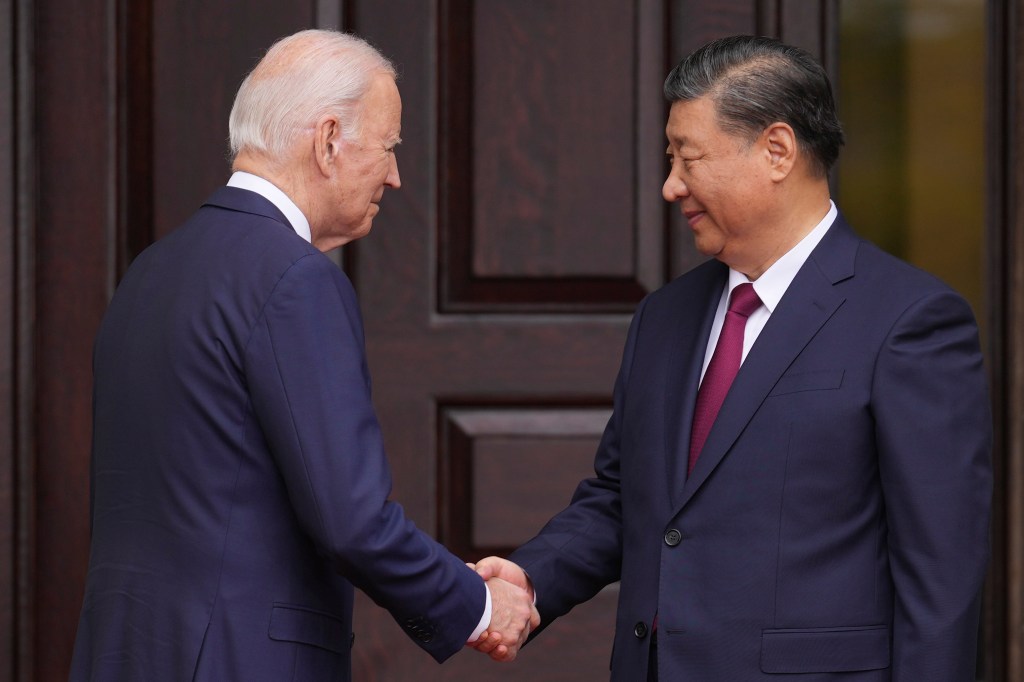“Every man, woman and child lives under a nuclear sword of Damocles, hanging by the slenderest of threads, capable of being cut at any moment by accident or miscalculation or by madness,” the American president told the world, friend and foe alike.
That was John F. Kennedy, speaking to the United Nations in 1961, in one of his many public entreaties to America’s adversaries and all humankind to limit the insanity of atomic warfare. His predecessor had started seizing the high ground in the nuclear age with bold ideas for controlling these diabolical weapons, and other presidents would continue, in time leading to arms-control and test-ban treaties, and helping (so far) to avert nuclear holocaust.
Joe Biden also used to speak regularly and urgently about the dangers of nuclear proliferation and war. But that was when he was vice president, and apparently moving toward endorsing an official U.S. policy of “no first use,” a doctrine to which only China among the world’s nine atomic powers subscribes today. Since becoming president, though, Biden has largely been silent on the subject. So has his vice president and possible successor, Kamala Harris.
Instead, Biden has apparently given classified instructions to the Pentagon to prepare for a new approach, based on deterring — that is, being able and determined to retaliate against — a concerted nuclear attack by Russia, China and North Korea. That policy shift occurred this spring, before he passed the baton in the presidential race to Harris.
The reasons for the new strategy are fathomable, and yet the new approach by Biden and Harris (to the extent that she’s privy to it) is wrong. Secret armaments or doctrinal shifts without public messaging will only make adversaries more paranoid and a full-on arms race all but inevitable, raising the risk of miscalculation by someone, somewhere, somehow.
World has changed
Biden’s decision does make a narrow kind of sense because the world has changed for the worse since his time as vice president. Russia has walked away from the last remaining arms-control treaty and broken taboos by threatening the tactical use of nukes in the context of its invasion of Ukraine. China is adding to its arsenal as fast as it can, with the goal of achieving parity with the United States and Russia in a decade or so. North Korea is adding to its stockpile. And Iran is poised to “break out” and build nukes at short notice.
Even more ominously, all four authoritarian powers, despite their differences, are increasingly behaving as an “axis.” They’re supporting one another diplomatically, economically and militarily, and aligning against the United States and what it stands for. Washington is becoming anxious that they could, in the course of escalation in any given Eurasian conflict, coordinate a nuclear strike against the United States or its allies.
This frightening scenario has some American policymakers arguing that the United States needs to enter and win a new arms race, with warheads and launch technologies that will in sum always match or exceed not only the arsenal of America’s only nuclear peer, Russia, but the combined forces of those four horsemen of the atomic apocalypse.
The cognoscenti of arms control counter that such a nuclear build-up would be foolish. Not only would it be economically ruinous and divert resources from America’s non-nuclear (misleadingly called “conventional”) military might. It would also be pointless, because in a nuclear war the absolute number of warheads stops mattering once you can convince any and all enemies that you could annihilate them even after they hit you first. America has that capability several times over.
Biden’s secret shift this year does not yet amount to launching such an arms race. That would have to go through Congress and survive the mother of all budget fights. There’s nothing wrong with such strategizing per se; in military matters as in life, readiness is all.
Time to go public
The problem is that neither Biden nor Harris — nor Donald Trump, for that matter — is talking publicly about these apocalyptic scenarios and choices as Eisenhower, Kennedy, Reagan and other presidents once did. In this election cycle, the foreign-policy controversy that hogs most attention is the conflict between Israelis and Palestinians, but that couldn’t escalate to nuclear war. You might think nukes would merit some sermons from the bully pulpit.
The more important audiences are in Beijing, Moscow and Pyongyang, but especially in Zhongnanhai. The Chinese have so far rebuffed American overtures to begin earnest negotiations on nuclear arms control. Officially, they maintain their stance of “no first use,” but Washington is skeptical whether they still mean it. Their nuclear build-up could mean that they want to assure themselves a second-strike capability. It could also suggest that they want options if a conventional attack on Taiwan risks failing.
By lining up with his Russian and North Korean counterparts, President Xi Jinping also seems to be calculating that he’s building, and indeed leading, a new anti-American front in preparation for a multipolar world order with Chinese characteristics.
Biden broached these concerns privately during his meeting with Xi in California last fall. But nothing has really come of it. So it’s time for him, Harris, Trump and others to exhort Xi and the world loudly and publicly. No Chinese leader can rationally desire a nuclear arms race against the world’s strongest economy. And everybody can agree that “a nuclear war cannot be won and must never be fought.”
Biden and Harris must remind Americans and their adversaries alike about what’s at stake. They could signal good faith by matching China’s pledge of no first use. And they must resume preaching what Kennedy said that time at the U.N.: Nuclear weapons “must be abolished before they abolish us.”
Andreas Kluth is a Bloomberg Opinion columnist. ©2024 Bloomberg News. Distributed by Tribune Content Agency.
